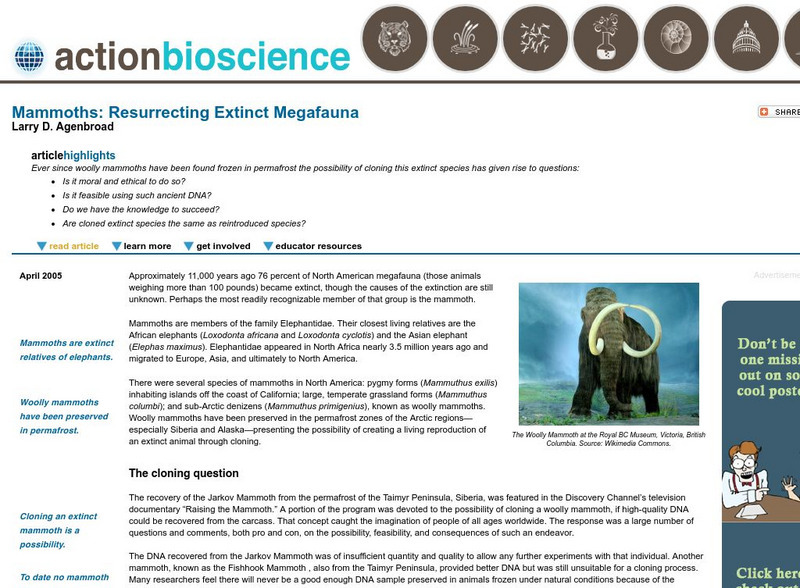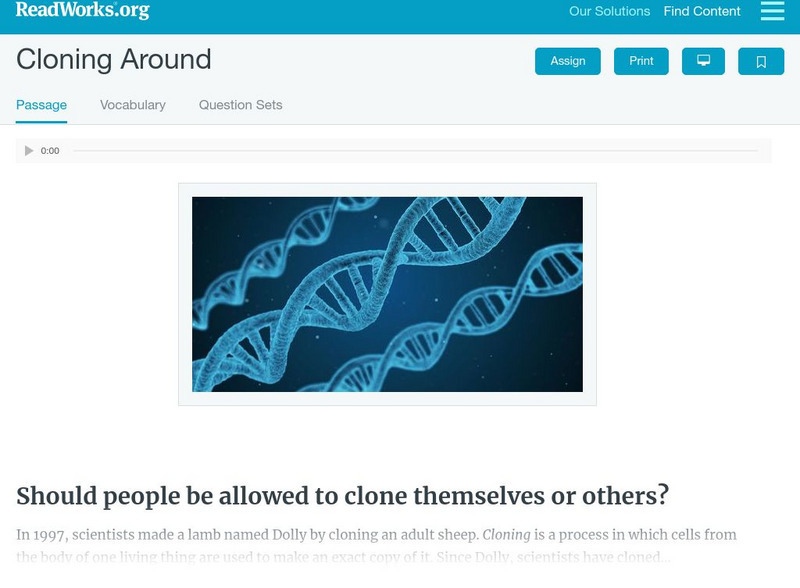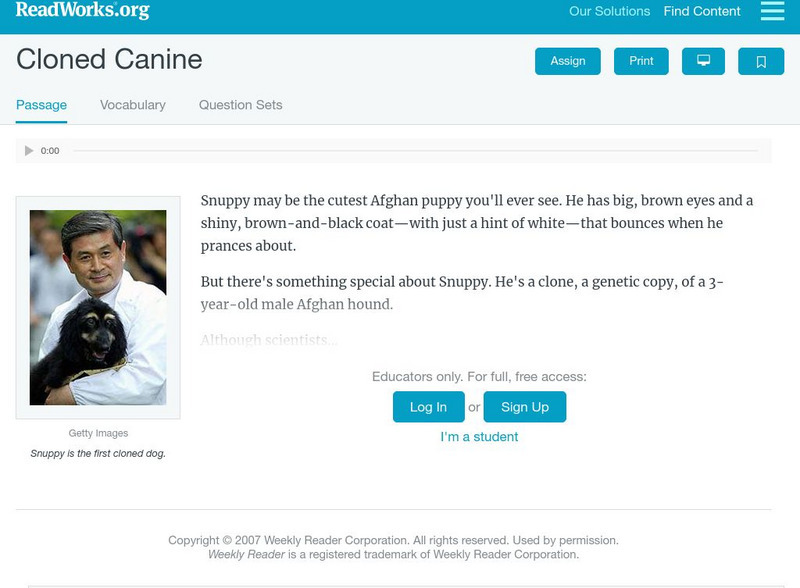American Institute of Biological Sciences
Action Bioscience: Mammoths: Resurrecting Extinct Megafauna
Explore arguments for and against cloning. Includes an introduction of how cloning can be done.
University of Utah
University of Utah: Learn Genetics: Click and Clone
Practice the steps of cloning in this interactive animation. Using what you know about somatic cell nuclear transfer, your mission is to create a genetically identical clone of Mimi, a brown female mouse. You'll answer a few questions at...
University of Utah
University of Utah: Genetics Science Learning Center: learn.genetics: Clone Zone
Interactive time line on the history of cloning over the last one hundred years. Includes detailed explanations and short animations.
University of Utah
University of Utah: Genetic Science Learning Center: What Is Cloning?
Media-rich detailed description of modern cloning technology and the two different processes used: artificial embryo twinning and somatic cell nuclear transfer.
The Association of the British Pharmaceutical Industry
Abpi: Cloning
An in-depth look at cloning and the technology behind it. Students work through interactive learning material, understanding the ethics involved in all types of cloning. There is a suggested classroom activity and a self-checking quiz at...
PBS
Pbs Learning Media: On Human Cloning
Three cloning experts share their opinions of cloning in these interviews from NOVA: "18 Ways to Make a Baby."
Cold Spring Harbor Laboratory
Dolan Dna Learning Center: Cloning 101
Students learn about the cloning process by watching an animation and reading a tutorial.
Science Education Resource Center at Carleton College
Serc: Human Cloning: Is It Biological Plagiarism?
This lesson guides students to learn the science behind cloning, explore the benefits and consequences of human cloning, and communicate their knowledge and points of view.
American Museum of Natural History
American Museum of Natural History: What Is a Clone? O Logy Card
Flip this interactive card to find questions and answers, fast facts, and other bite-size pieces of information to help you understand cloning.
Read Works
Read Works: Cloning Around
[Free Registration/Login Required] An informational text debating whether human cloning should or should not be allowed. A question sheet is available to help students build skills in reading comprehension.
Read Works
Read Works: Cloned Canine
[Free Registration/Login Required] An informational text about the first scientists to successfully clone a dog. A question sheet is available to help students build skills in reading comprehension.
CK-12 Foundation
Ck 12: Life Science: Cloning
[Free Registration/Login may be required to access all resource tools.] Cloning is the process of creating an exact replica of an organism. The clone's DNA is exactly the same as the parent's DNA. Bacteria and plants have long been able...
University of Utah
University of Utah: Learn Genetics: Is It Cloning? Or Not?
Play a game and decide whether the scenario described involves cloning.
BBC
Bbc: Gcse Bitesize: Mitosis and Cell Specialisation
This lesson focuses on cloning. Plants can make identical copies of themselves by asexual reproduction, for example by tubers and runners. Humans have been cloning plants for years and have recently started to develop techniques to clone...
American Institute of Biological Sciences
Action Bioscience: Animal Cloning, Old Mac Donald's Farm Changed
An in-depth look into the potential benefits to animal cloning. This process could provide us with food designed to help fight disease, protect endangered species, enhance livestock, and create opportunity for biomedical research.
CommonLit
Common Lit: Book Pairings: "Frankenstein" by Mary Shelly
The scientist Victor Frankenstein recounts his story of bringing a creature to life and the tragedies that followed. Selected (8) reading passages (grades 8-12) to pair with the horror novel "Frankenstein" by Mary Shelly. [Free account...
Alabama Learning Exchange
Alex: What Is Cloning?
This is an interactive website that answers the question on "What is Cloning?" There are multiple links for interactive learning about cloning. There are also video links about nuclear transfer.This lesson plan was created as a result of...
CK-12 Foundation
Ck 12: Life Science: 3.18 Cloning
Understand the science and ethics behind human or animal cloning.
American Museum of Natural History
American Museum of Natural History: O Logy: All About Cloning
Learn what cloning is, how it works, what animals have been cloned, and about Dolly, the first mammal (a sheep) to be cloned from an adult cell. Click on the links to see flash cards on the topics.
Mocomi & Anibrain Digital Technologies
Mocomi: What Is Cloning?
Defines cloning and how it works. Learn about the cloning of Dolly the sheep and other interesting facts.


















